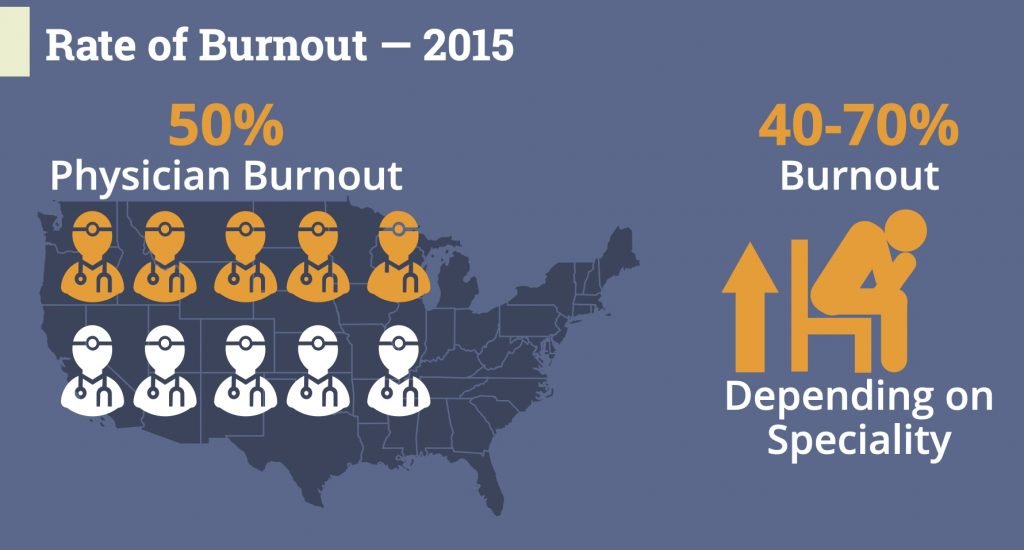Even before the pandemic, healthcare professionals, and in particular, physicians, have been burning out at record rates. A landmark study by Tait Shanafelt, et al., at Stanford University found that 45% of US physicians were experiencing significant burnout in 2012, with rates increasing to 50% by 2015, and 40-70% depending on specialty.

Although medical organizations are working on interventions to address burnout systematically, many physicians are left to cope with burnout on their own—a tall order for those who already have too much on their plates, and often a lonely endeavor for professionals already feeling isolated.
Duke faculty and physicians Ryan Bayley and Farr Curlin, however, hope to offer their peers another option with their 4-week online course, Intentional Practice for Christian Physicians: Tools to Recover Your Calling, which begins October 24. The course, originally offered in a secular form through Duke Alumni Affairs in Fall 2018, has been reformatted to address a Christian audience in partnership with Duke Divinity School. (This course is eligible for 10.0 AMA PRA Category 1 Credit(s)™.)
Bayley and Curlin introduce the course in this short video:
“The physician burnout world is full of ideas for self-care and stress management,” Bayley says. “And these are critically important and often overlooked. But for many, these are simply not enough. This course goes further, and uses evidence-based tools to help clinicians explore meaning and calling, and use that to create a specific plan for living a more vital life.”
A course for physicians by physicians
Curlin and Bayley are effective course instructors and coaches because they’ve lived through burnout and found ways to mitigate its effects. Curlin received his MD from UNC-Chapel Hill, doing his residency and fellowship at the University of Chicago, and then going on to practice in palliative care and found and co-direct the Program on Medicine and Religion at UChicago. Since 2014, Curlin has served as the Josiah C. Trent Professor of Medical Humanities in the Trent Center for Bioethics, Humanities and History of Medicine at Duke, and Co-Director of the Theology, Medicine and Culture Initiative at Duke Divinity School.
Bayley received his MD from Vanderbilt University and is double boarded in Emergency Medicine and Emergency Medical Services. In 2013 he also trained as an executive coach, and founded one of the few coaching and consulting companies dedicated to working with medical professionals. In addition to coaching and speaking nationally on physician career design, he continues to work clinically in Granville County, NC, and holds an adjunct position at Duke University.
“Many of us live in a perpetual state of too-muchness,” Bayley says. “Too much to do, too many expectations, too many unsolvable problems. Live this way for any amount of time, and you will find yourself just going through the motions. You will work harder and harder, and yet that will not translate into a sense of fulfillment at the end of the day. When I personally found myself stuck this way, I tried everything imaginable. The only thing that ultimately helped was a structured process for slowing down and systematically reconnecting with values and a vision for what I really wanted.”
Course elements
In the Intentional Practice course, Curlin and Bayley draw on their experiences in the field to help other physicians, with Bayley providing evidence-based techniques that have proved successful in his coaching career, and Curlin setting a theological framework for moving from moral injury to a values-based vocation supported by faith. After taking stock of physician burnout and its causes, Curlin and Bayley guide learners through weekly exercises that explore their deepest values and vocations, culminating in a clear action plan for overcoming the obstacles that make it difficult to live and practice medicine according to those commitments.
Each week, learners watch succinct, studio-recorded videos, read 1-2 articles, and complete several activities in a custom-designed, printed workbook, before the week’s Zoom session. Here’s a sneak peek at one of the course videos:
Then Bayley, Curlin, and the learners gather on Zoom to discuss their experiences with burnout and what’s holding them back from making changes. While the experiences vary, the refrain is the same—exhaustion, overwhelm, loss of satisfaction in work and life, struggling relationships, and a loss of meaning in their work. Simply having the opportunity to share their struggles with a group of their peers starts learners on a road to recovery.
Small group connections
In these discussions, Bayley and Curlin come to the table not as experts who have it all figured out, but as peers who have been there, and who still have to make an effort to avoid falling back into burnout. Through the four weeks together, the instructors and learners are able to bond, commiserate, and find new perspectives. Learners also are encouraged to journal regularly and to explore other optional resources, articles, and videos along the way.
Then, in the culminating week of the course, learners receive a series of case studies that details how actual physicians have made changes to relieve burnout. These case studies provide additional approaches for learners to consider as they work on their own action plan for a better life.
As Curlin urges fellow physicians, “Don’t let learned helplessness and ‘the system’ keep you from the joy of practicing medicine.”
To learn more about the course and register, visit the Duke Divinity Events page. Registration closes October 11.

